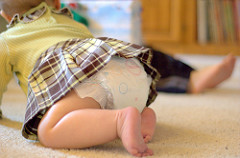 Families with newborns quickly learn that diapers are expensive. Many families struggle to be able to afford enough diapers for their babies. This leads to difficult choices like whether to spend money on food, diapers, or utility bills. The Obama administration has a plan that utilizes technology to help solve this problem.
Families with newborns quickly learn that diapers are expensive. Many families struggle to be able to afford enough diapers for their babies. This leads to difficult choices like whether to spend money on food, diapers, or utility bills. The Obama administration has a plan that utilizes technology to help solve this problem.
Nearly one in three Americans cannot afford to purchase enough diapers for their babies. In some cases, parents cope by stretching the length of time between diaper changes. This can lead to serious health problems for babies and parents.
Babies can end up with urinary tract or staph infections. Parents can experience additional stress because they must make difficult choices about where to spend their limited funds – on food, rent, utilities, or on a healthy amount of diapers. In some cases, this kind of stress can contribute to the incidence of abuse and neglect of young children.
Parents from the lowest-income quintile of families with infants pay 14% of their income on diapers alone. This average out to $936 for diapers, per child, each year. Supplemental Nutrition Assistance Program (SNAP) does not cover the cost of diapers. The Special Supplemental Nutirtion Program for Women, Infants, and Children (WIC) does not cover diapers, either.
Families with more money are able to cut down the cost on diapers because they are able to travel to a big box store and buy diapers in bulk. Or, they can afford to pay to have an online purchase of diapers shipped to their home. Some pay for a cloth diaper service instead of buying disposable diapers.
The Obama Administration has set aside $10 million dollars in the budget to test effective ways to get diapers to families in need and to document the health improvements that result. The problem is that this money cannot be used unless Congress acts. Meanwhile, struggling families wait for help.
President Obama went to SXSW to highlight a cross-sector strategy to expand diaper access to American’s poorest families – that doesn’t require waiting for Congress to act. It involves a partnership between online retailers, diaper manufactures, and non-profits. Covenant House will now be able to double the number of diapers they can order with the same amount of money. They can also cut the shipping time down from one week to two days.
Families who are in need of diapers can also check to see if a diaper bank is located somewhere near where they live. The National Diaper Bank Network (NDBN) members are independently operated diaper bank organizations working in the United States.
Huggies will donate two million free diapers to the NDBN and will match any public donations (up to one million diapers). The Honest Company will donate up to one million diapers to Baby2Baby.
Image by David Goehring on Flickr.
Related Articles at Families.com:
* Good Reasons to Use Cloth Diapers
* Cloth Diapers: Snaps, Clasps, and Pins

